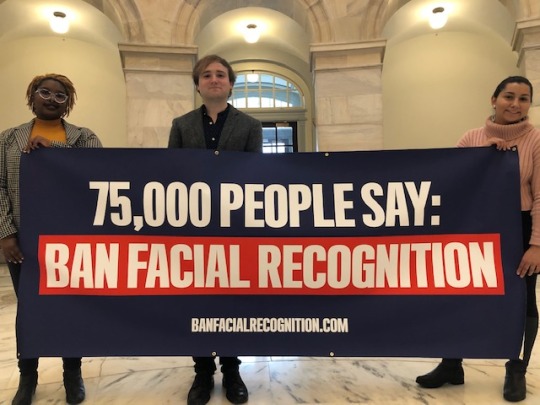Groups deliver more than 75,000 petitions calling for Congress to stop stalling and pass a ban on government use of the technology

FOR IMMEDIATE RELEASE: December 16, 2019
Contact: Evan Greer, 978-852-6457, press@fightforthefuture.org
“This is the single largest display of public opinion on the issue, and the message could not be more clear”
WASHINGTON, D.C. — Today, leaders of grassroots organizations delivered more than 75,000 petitions to members of Congress calling for an outright ban on government use of facial recognition technology.
“This is the single largest display of public opinion on the issue, and the message could not be more clear: people understand that this technology is dangerous when it works and when it doesn’t, and the only way to protect our privacy and our civil rights is to ban its use,” said Evan Greer, Deputy Director of Fight for the Future, one of the organizations involved in today’s delivery. “We’re calling on Congress to stop stalling and take immediate and definite action to protect people against the many and unavoidable dangers of facial recognition.”
The petition delivery was intended to be before a hearing of the House Oversight Committee on the national security implications of facial recognition technology. But that hearing was postponed and committee members stated that they’ll wait to bring up the issue again in the new year. “This technology is spreading incredibly quickly. We don’t have time for Congress to slow-walk this or turn it into a partisan circus,” added Greer. “This is an issue of our safety and our civil rights, and this technology is already causing undue harm to real people. We keep hearing that the impeachment making everything slow down, but it isn’t slowing down the spread of facial recognition. We need our representatives to stop punting and get to work.”
“The rapid spread of facial-recognition technology has outpaced our ability to keep its many abuses in check. In particular, this dangerous technology allows law enforcement and corporate actors to monitor and identify individuals without their knowledge or consent,” noted Sandy Fulton, Government Relations Director at Free Press Action Fund. “If past experience is any guide, law enforcement disproportionately surveils people of color, religious minorities and dissident groups in ways that undermine their rights to privacy, free expression and free assembly. We can only imagine how dangerous this new spying capability is when used at a protest or religious gathering. The technology is less accurate when used to identify—or rather, so often misidentify—people of color, raising incredibly troubling racial justice issues. No regulations could account sufficiently for the serious threat facial recognition technology poses.”
The group delivered petitions to Representatives Maloney and Jordan of the House Oversight Committee to highlight to public demand for action. The group also delivered petitions to Senators Coons and Lee who recently introduced a bill related to facial recognition that falls short of the type of legislation needed. “This bill would do nothing to prevent the type of invasive facial recognition surveillance that is already being conducted across the country,” said Greer. “And it contains gaping loopholes that authorize government and law enforcement to deploy facial recognition surveillance in all kinds of abusive ways. We hope this massive display of support for a ban on government use of facial technology will encourage the Senators to rewrite their legislation to actually protect people from the technology.” The group also called on Senate and House leadership to commit to moving legislation on facial recognition forward.
In addition to delivering these petitions, Fight for the Future conducted live facial recognition surveillance last month in the halls of Congress and around D.C., using Amazon’s commercially available Rekognition software. The group conducted more than 13,700 facial scans, and correctly identified one member of Congress in real-time: Representative Mark DeSaulnier of California. But the software also falsely identified 7 journalists and 25 Amazon lobbyists, and it even thought that it spotted singer Roy Orbison, who of course has been deceased since 1988 (RIP). This action underscored the message that facial recognition is invasive and dangerous when it works, but it’s also dangerous when it doesn’t work.
The petitions came through BanFacialRecognition.com, which is the largest campaign dedicated to stopping the spread of facial recognition, comprised of nearly 40 organizations representing more than 15 million members, including: 18 Million Rising, Arab-American Anti-Discrimination Committee, Black Alliance for Just Immigration, Color of Change, Constitutional Alliance, Consumer Action, Council on American-Islamic Relations, Daily Kos, Defending Rights and Dissent, Demand Progress, Detroit Community Technology Project, Detroit Digital Justice Coalition, Electronic Privacy Information Center, Fight for the Future, Free Press Action, Greenpeace USA, Jewish Voices for Peace, Media Alliance, MediaJustice, Mijente, MoveOn, MPower Change, Muslim Justice League, National Lawyers Guild, Oakland Privacy, Open Media, Other 98%, Popular Resistance, Presente Action, Privacy Times, Restore the Fourth, RootsAction, San Francisco Public Defender, Secure Justice, Surveillance Technology Oversight Project, United We Dream, Privacy Times, and X-Lab.
###

